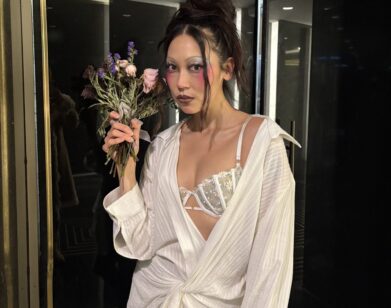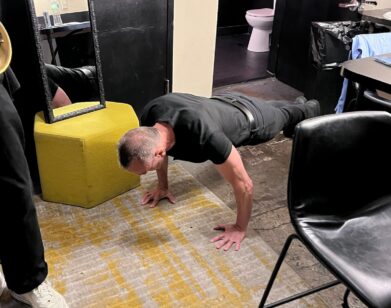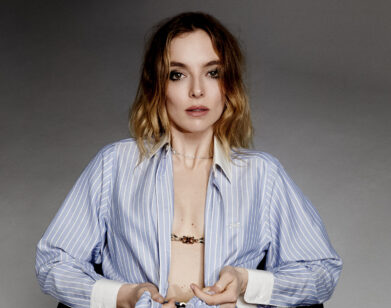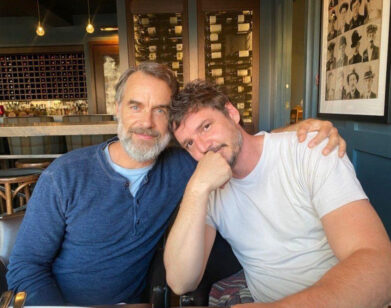COVER
Jeremy Allen White’s Delusions of Grandeur
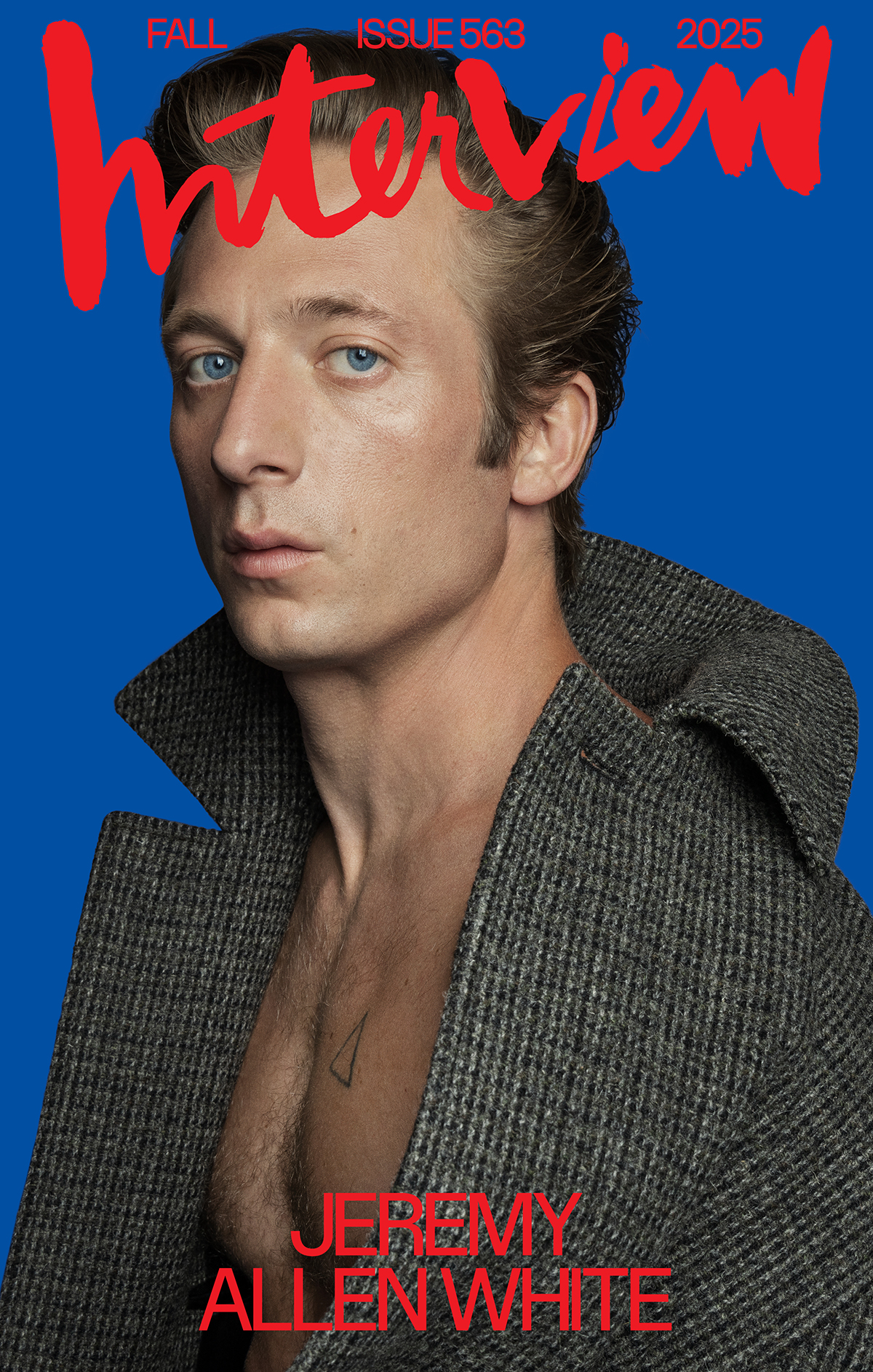
Jeremy Allen White wears Coat Celine.
Jeremy Allen White can’t stop cooking. After his role as Carmen Berzatto on The Bear made him a household name, the 34-year-old actor is turning up the heat as Bruce Springsteen in Scott Cooper’s biopic Springsteen: Deliver Me from Nowhere. It’s the kind of responsibility that might crush a less obsessive actor, but White—who picked up guitar and took vocal lessons to channel the Boss in his Nebraska era—wears the pressure like a second skin. To talk it through, he called Austin Butler, who understands better than anyone the strange vertigo of chasing immortality onscreen.
———
FRIDAY 1 PM AUG. 15, 2025 LA
AUSTIN BUTLER: There he is.
JEREMY ALLEN WHITE: Yo, what’s happening, man?
BUTLER: How are you, brother?
WHITE: I’m really good. I’m so happy to see you.
BUTLER: Are you in New York?
WHITE: I’m home in L.A. I got back on Monday. The girls are back in school. It’s like, “We’re back!”
BUTLER: You’re back. But you got that summer glow. Look at you.
WHITE: Yeah, dude, it was so nice. I fell in love with it over there. I wish you could have come out. Where have you been bouncing around?
BUTLER: We’ve been all over. After we finished [shooting their upcoming movie, Enemy] in Chicago, I went to L.A., and then we’ve just been on this press tour. We started in New York, then Puerto Rico, then Texas, then back to New York.
WHITE: Dude, how crazy was it being at a Bad Bunny show in Puerto Rico?
BUTLER: I couldn’t even fathom what I was experiencing. It was so impactful to see what he meant to all of them. Did you go to his show when you were—
WHITE: I’ve never seen him live.
BUTLER: But you spent a fair bit of time out there.
WHITE: Yeah, I’ve been out there. Addison [Timlin, Jeremy’s ex-wife] did a show out there for years. It was shot in San Juan, but then we’d go to Vieques and Culebra, which are these little islands. Vieques is very small, but it’s got three of the top ten most beautiful beaches in the world. And there’s wild horses running everywhere.
BUTLER: Oh my god. Did you ride horses on the beach?
WHITE: No, I didn’t get on any of the horses. I was too afraid. They’re wild, man.
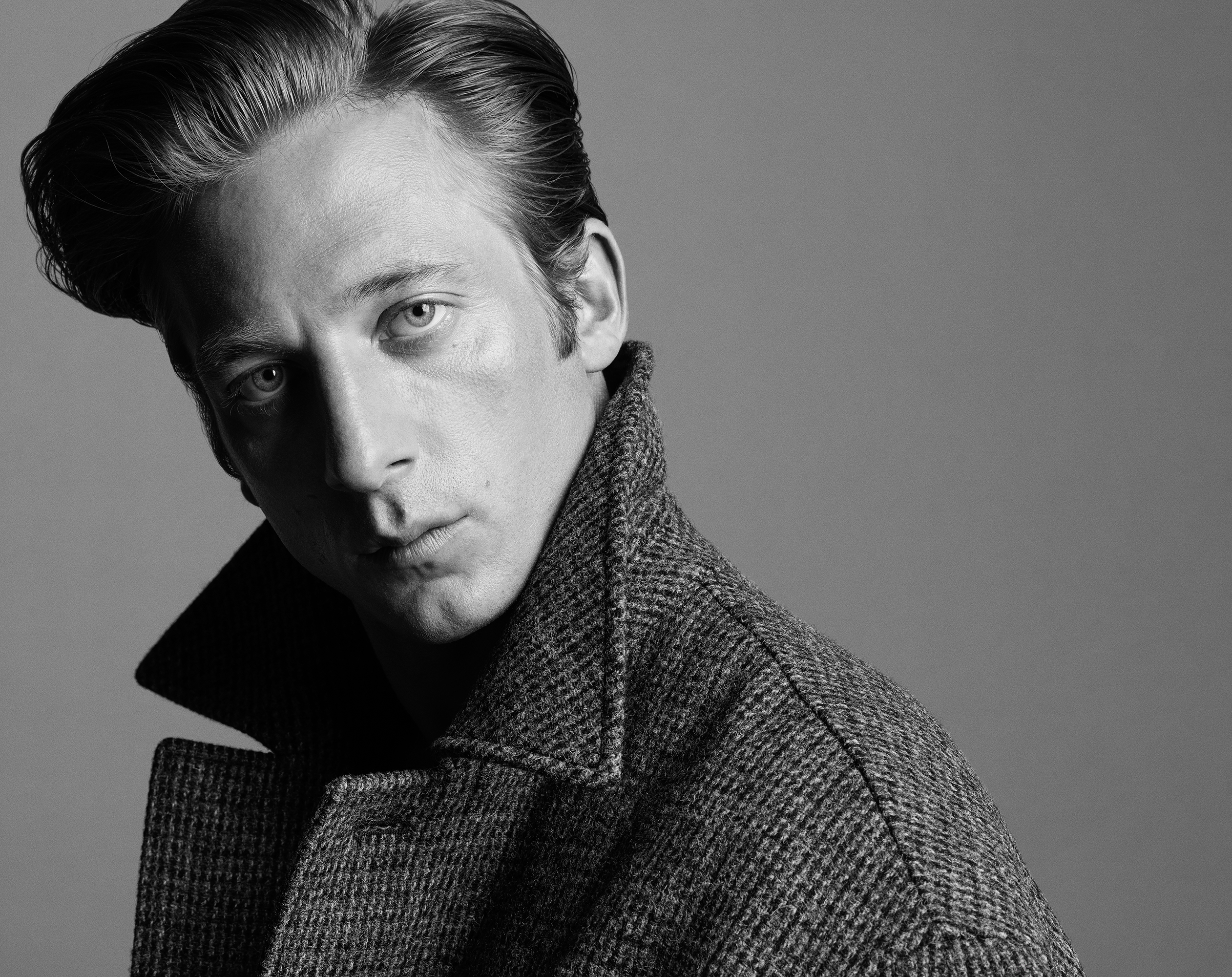
Coat Celine.
BUTLER: My dad tried to get on a wild horse.
WHITE: He did?
BUTLER: Yeah, but he hopped on the horse without a saddle. It took about three bounds and each time he got more and more parallel to the floor and then eventually fell off the horse completely.
WHITE: How old were you?
BUTLER: Nine or ten.
WHITE: Your dad’s wild. I want to meet him one day.
BUTLER: You’ve got to. Alright, so you just got back. Are you taking a bit of time to just take a breath?
WHITE: Yeah. When I was out at that house, the rental, I wasn’t paying attention to anything. I was ignoring emails and texts and just kicking it. It was all ice cream and fireflies and ocean. It was so sweet. Now I’m coming to terms with what these next couple months are going to look like and how much I’m going to be bouncing around. But I’ve got to the end of the month to take the girls to school and pick them up and make dinner and just be here.
BUTLER: That’s so nice. And then you start traveling around?
WHITE: Yeah, late August. We go to Telluride, and then I’m in New York for a bit, and then back here, and then back in New York. There’s three days where I feel like I’m getting on four different flights between L.A. and New York.
BUTLER: When you’re on a plane, are you a music guy? Are you a podcast guy? Do you read? Do you sleep?
WHITE: I start with music or a podcast, and then I try to sleep. I try to use that time wisely and rest as much as possible. I used to watch a movie, but I don’t do it as much anymore. I don’t know if it’s the oxygen or that you’re so far away from the rest of the world, but people think you get more emotionally involved in a movie when you’re on a plane.
BUTLER: You think that’s why?
WHITE: Maybe I got tired of crying in front of people on the plane. I’d watch these great movies and then I’d be like, “This isn’t how Paul Thomas Anderson intended me to watch this.” [Laughs]
BUTLER: You ever have those times where people are like, “I watched your movie on a plane?”
WHITE: And you’re like, “Oh, wonderful!”
BUTLER: Exactly how it was intended. [Laughs]
WHITE: Exactly.
BUTLER: I watched Oscar Isaac and Jessica Chastain’s Scenes from a Marriage on a plane, the entire series.
WHITE: No shit.
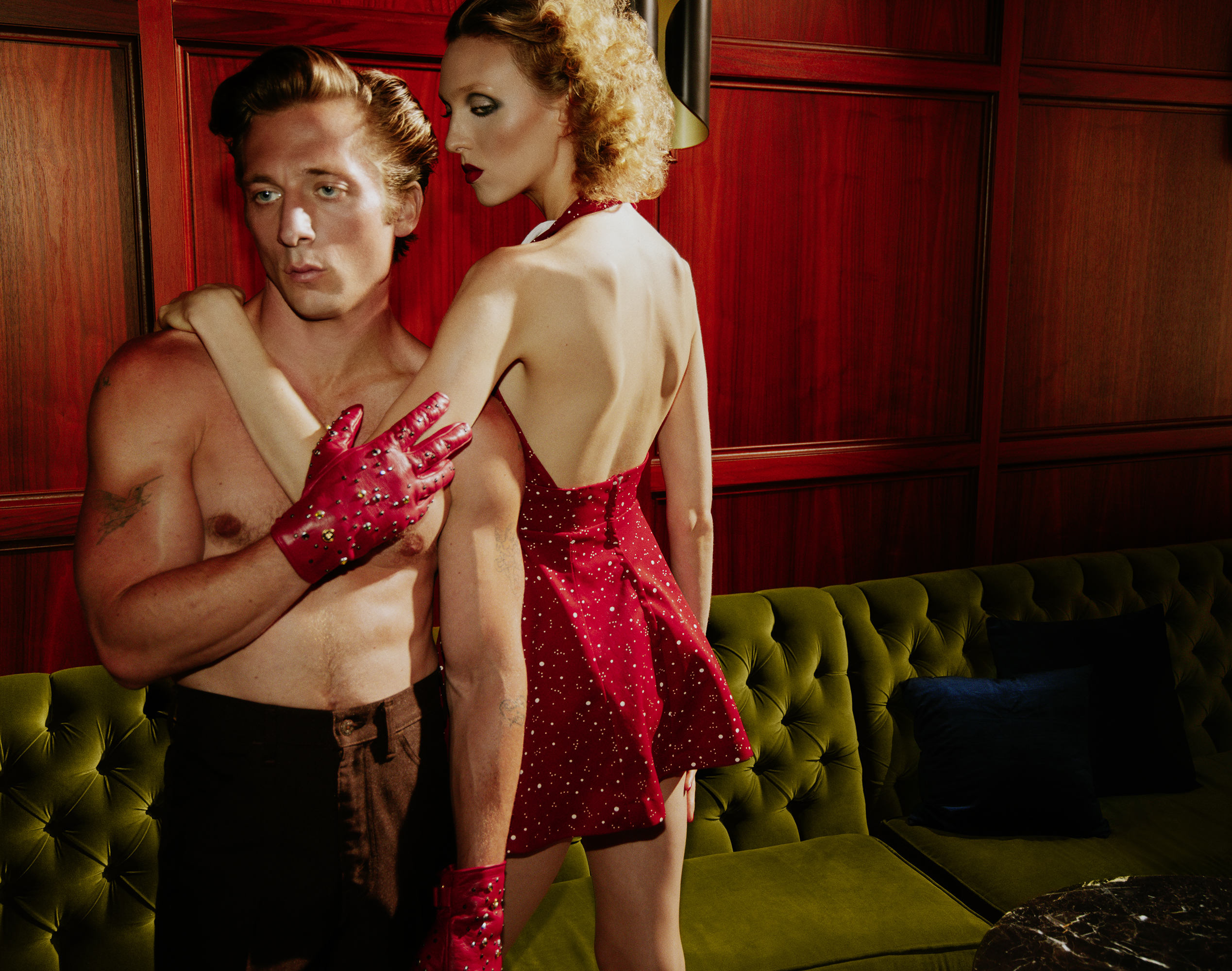
Jeremy wears Pants Western Costume. Gloves Versace. Delilah wears Dress Western Costume.
BUTLER: I wept. I cried in front of everybody.
WHITE: Of course.
BUTLER: A blubbering mess.
WHITE: So good.
BUTLER: Oh, look at this segue. I did not watch your film on a plane. I got to go by myself to this movie theater, and I brought a friend with me. I’ve said this to you over text, but I want to say it for this article right now: You are so beautiful in this movie, man.
WHITE: Oh, thank you. That means so much. It made me so happy that you saw it.
BUTLER: I was truly so moved by your work. I know that is not easy, man. When you put it on every level, physically, vocally, and also the lead-up to it all—the responsibility one feels.
WHITE: Totally. Playing any real person is a scary thing regardless of how well they’re known. There’s an incredible amount of pressure telling a story that’s happened. But when you’re playing somebody who’s so recognized and so beloved, it amps it all up, which you know so well. Obviously we sat at Bavette’s [Steakhouse & Bar] and spoke about Elvis and Bruce, but I don’t remember if you told me how you dealt with what I imagine must have been anxiety gearing up to it. Were you just like, “Let me dive in”? Was that what was fueling the commitment? Was it fear, anxiety, or was that not a part of it for you?
BUTLER: It was a whole lot of fear. I started calling it free energy. I didn’t need a cup of coffee, because I would wake up at 4 in the morning with my heart pounding.
WHITE: Dude, totally. Every morning I woke up, I was off to the races. There were no lazy mornings.
BUTLER: Exactly. And I was fortunate to be far from the life that I lived on a day-to-day basis, because I was in Australia. And then COVID happened, so the entire world was a different place. We’ve talked about the word delusion. It allowed me to immerse myself in the delusion a little bit more than I would’ve otherwise. Maybe we could talk about what that word means to you in the context of acting. Or is there another word that you’re thinking of when it comes to this?
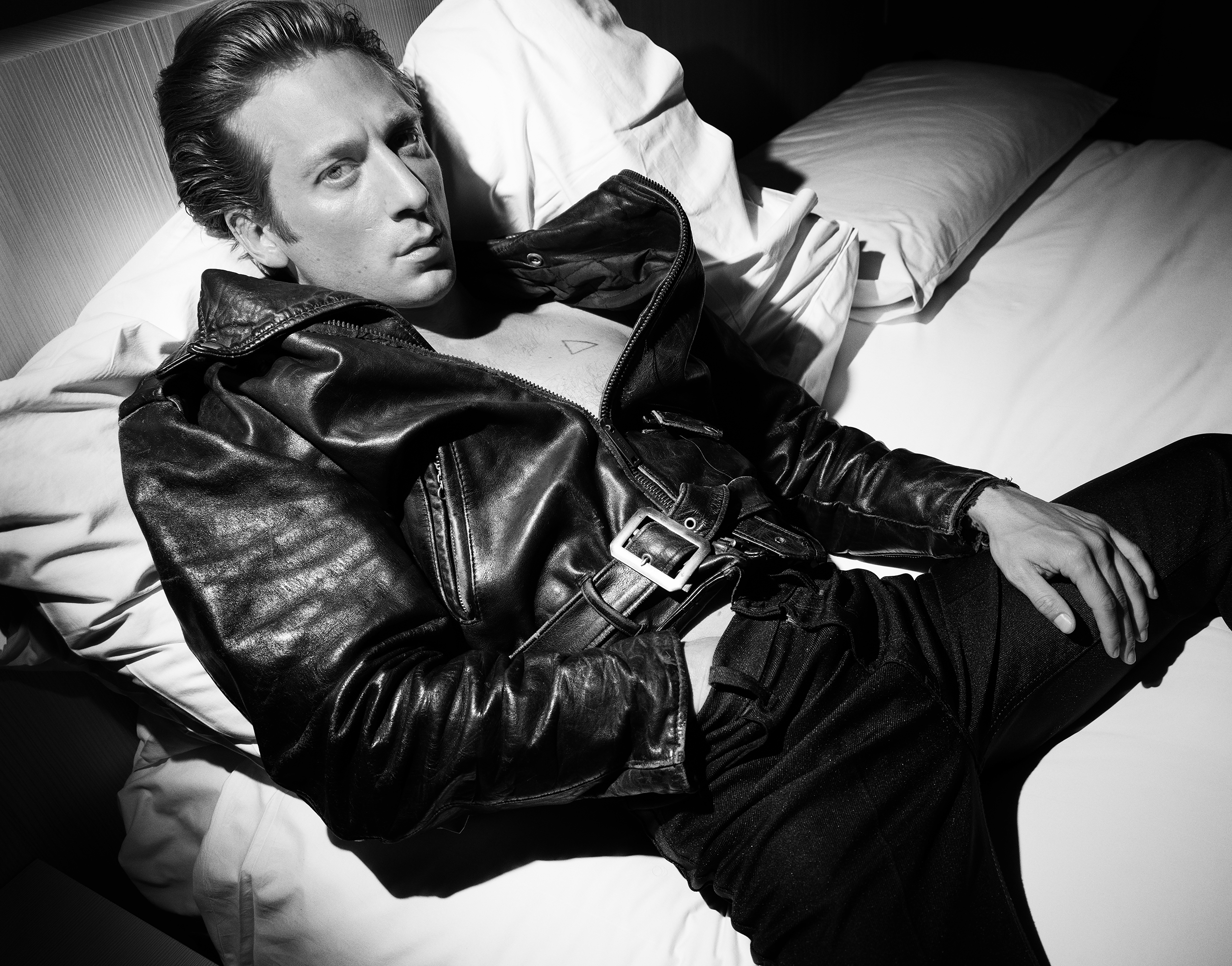
Jacket The Vintage Twin. Pants Western Costume.
WHITE: I think delusion is an appropriate word for acting in general. It’s about how well you can trick yourself, and not in a method-y way. Not to convince yourself that you’re entirely another person, but just for brief moments—30 seconds, 45 seconds, three minutes. Can you give yourself over to another environment and situation? I think in order to do that, there has to be a certain amount of delusion or romanticism. And when you’re playing someone who’s real and still with us and still with me—a lot of those days that we were shooting, he was on set with me—that chase for delusion was more difficult.
BUTLER: Yeah.
WHITE: Bruce was a producer on the film, and he and his manager, Jon Landau, who Jeremy Strong plays in the film, were both around quite a bit. They’ve had this beautiful relationship for so long, and they’ve been so in control of Bruce’s career, of his image, of every aspect of his public life. It makes total sense why these guys would want to be around as much as they were because I think it’s the first little bit of control that they’ve ever given up, to Scott [Cooper], our director, and to me and to everybody. And so I totally understand him wanting to be there.
BUTLER: Right.
WHITE: That first week was particularly jittery for me, but Scott was such a sweetheart. He made it little bits and pieces. There was no heavy stuff. In some movies, the first day is screaming at your wife or breaking down and crying alone in a room. I didn’t have any of that, and I think it was by design. But Bruce was around, and I talked to him at the end of the week. I was like, “If I could just have a little bit of space to try and find my footing.” He was like, “I totally understand. Not a problem.” I think he was gone for two days, and then he came back and he was like, “How was that space?”
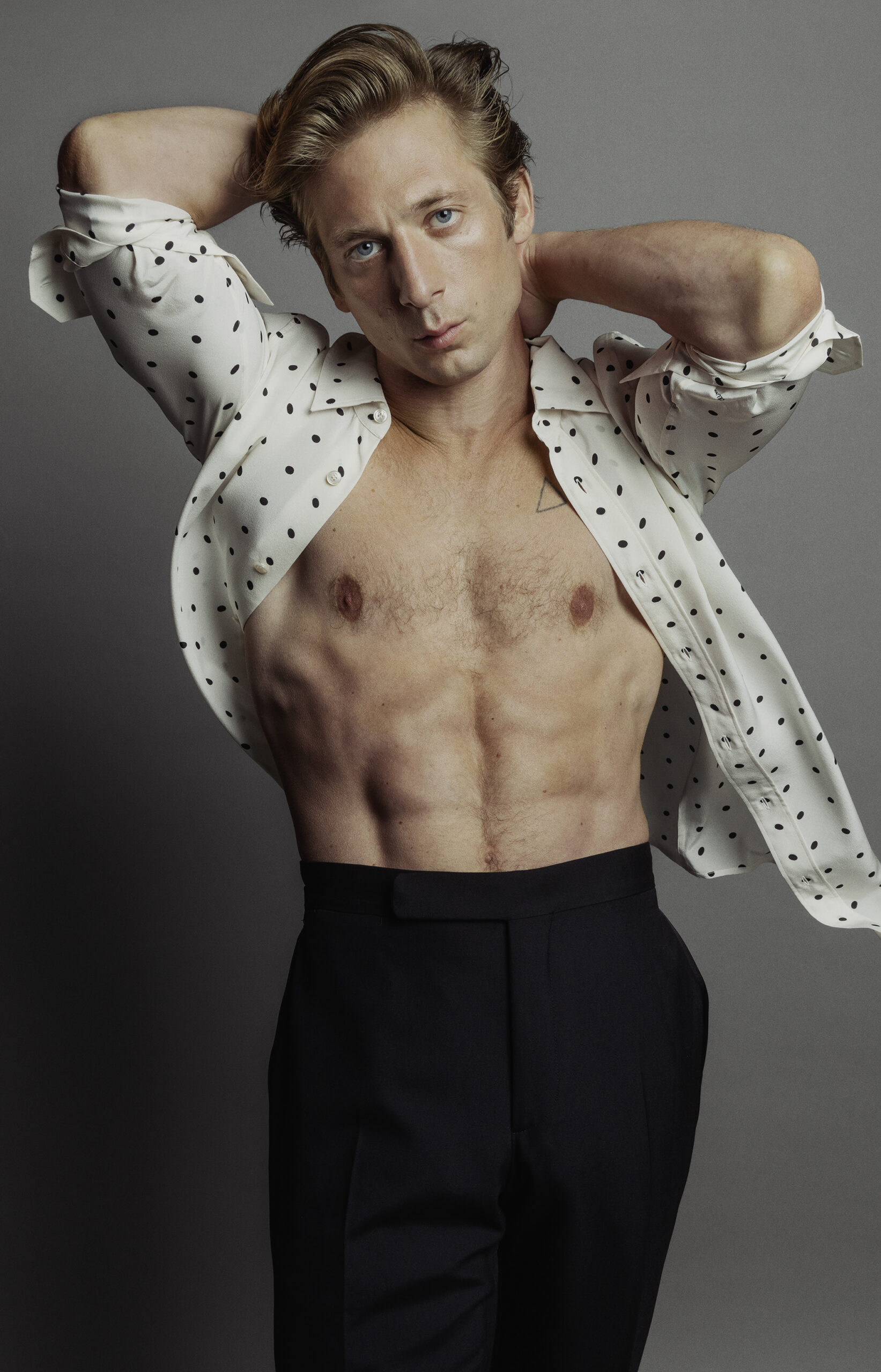
Shirt and Pants Celine.
BUTLER: [Laughs]
WHITE: I’m so impressed by him in so many ways, but I think the biggest way is after all the success and notoriety, his relationship to the world feels pretty unchanged. He’s very available to everybody that comes up to him. It must be difficult to be a rock star of that age and still be so in touch with the world.
BUTLER: For sure.
WHITE: He was always available if I wanted to come to him with something, but if he wanted to come to me with something, he’d always go through Scott. I think he knew that if I was doing a scene and he came up to tell me something—not necessarily a criticism, but any form of direction—that it might shatter me in some way. But I will say, almost every night before bed, he’d send me a text about some moment that day that he found particularly honest or affecting.
BUTLER: Wow.
WHITE: Those little messages made it possible for me to sleep that night and show up the next morning. Because there were some days where I was feeling so overwhelmed, not only with this period of Bruce’s life and telling that story honestly, but with the instrument or my singing capabilities.
BUTLER: I can’t imagine what it would feel like experiencing that in the midst of it, because I know the feeling. I mean, I’ve experienced it even when I’m not playing somebody who’s lived. But when you’re portraying a real human being, and then on top of that, somebody you admire, there’s that feeling of driving home in that car and thinking of another way I could have approached the scene.
WHITE: Yeah. The drive home. At the end of every day you’re like, “What if I did this? Or what if I did that? Is that a missed opportunity?” You’re filled with doubt every night. Like I said before, this was a period in his life when he was alone, so you also have to think, “What does that feel like for Bruce?” It was this incredibly isolated and intimate time where he had very few angels. And then for there to be a film crew and a young actor and a director and all these people showing him these private moments, that’s got to be heavy.
BUTLER: Absolutely. Thinking about those private moments, when you’re delving into somebody else’s memories, how did you explore the boundaries of—because I remember having moments early on where I was going, “Vocally, is this something Elvis would’ve said? Is this how his voice would’ve been?”
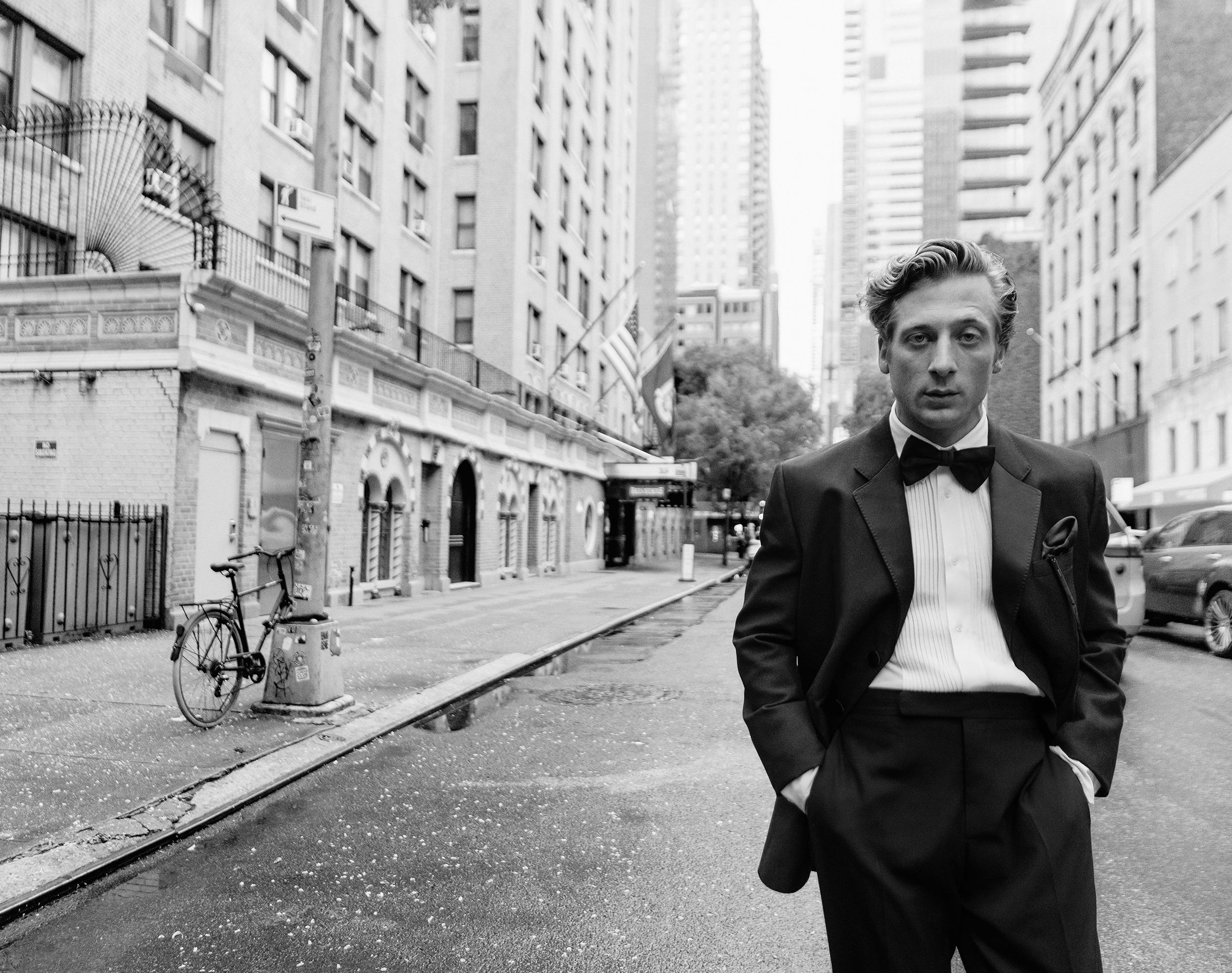
Tuxedo, Shirt, Bow Tie, and Sunglasses (in pocket) Celine. Pocket Square The Vintage Showroom.
WHITE: Totally.
BUTLER: It becomes a boundary. And then at a certain point you blow the roof off and it’s your soul and his soul merging in some way. Did you have any moments like that?
WHITE: I know exactly what you’re talking about. I can look at his performances and I can watch interviews, but these are public versions. They’re performative in some sense. No matter how honest you are when you’re talking to the press, that’s not how you’re going to talk to your mother. I was running into the same thing where I was like, “Does this sound or look like him?” Because I had all this footage I could go off of, but you don’t know what this man looks like alone in a house. There’s more freedom, but then you’re questioning that freedom. It’s exactly what you said. At a certain point, you let go and hope that whatever feeling you’re getting close to at least held hands with Bruce’s feeling.
BUTLER: How early on in shooting did you film the concerts? You have quite a few.
WHITE: A lot of that stuff was toward the end by design.
BUTLER: Did you have a dialect coach that you worked with?
WHITE: No. I listened to him so much that it was driving me crazy. If you listen to Bruce during that time, he sounds a certain way. His voice is so—I was reading this interview with Sebastian Stan after he did The Apprentice, about Trump. He said it was so difficult to do that voice because everybody does a Trump.
BUTLER: I heard one at the farmers’ market the other day.
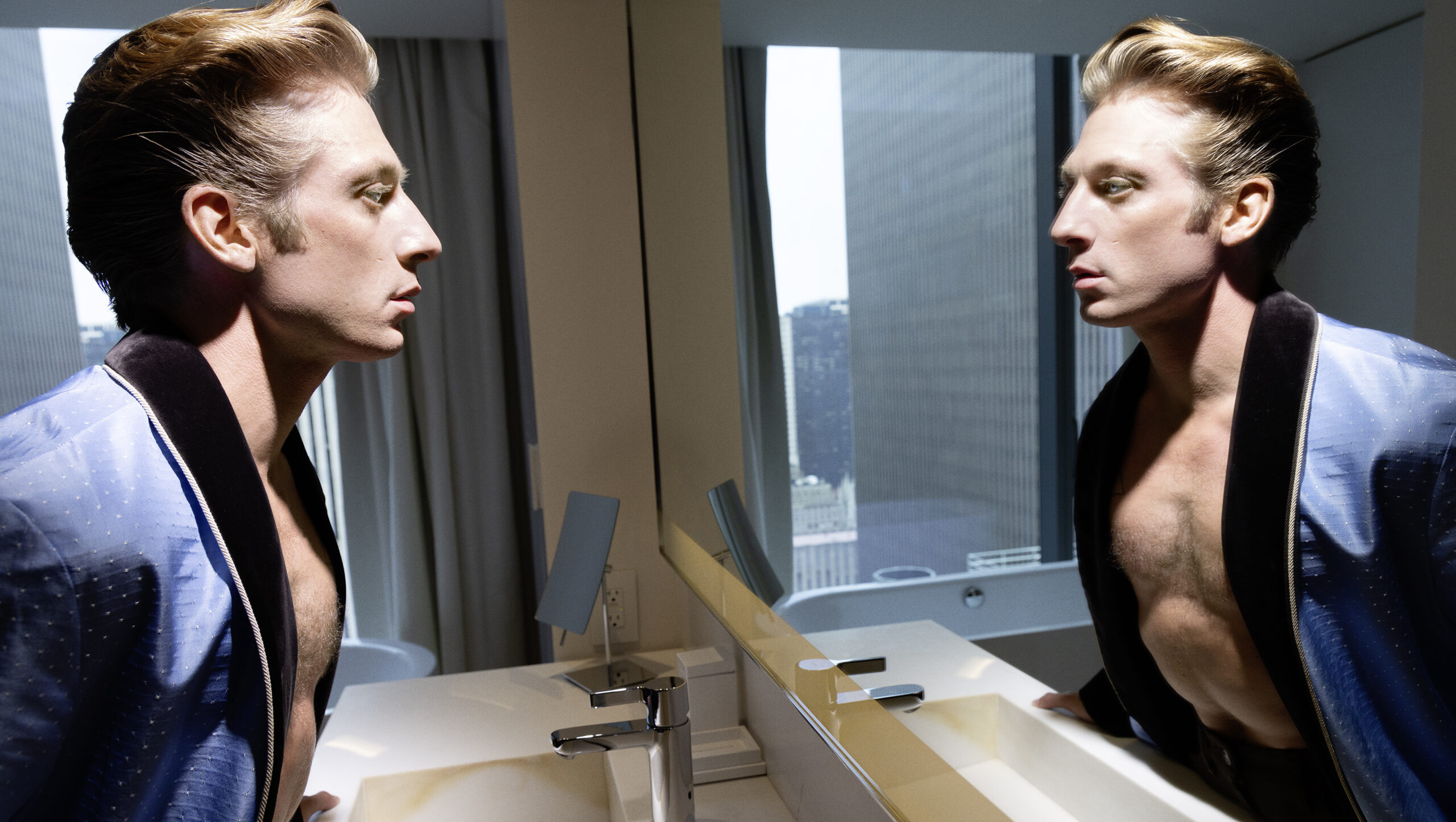
Robe Tom Ford.
WHITE: Exactly. And so many people do Bruce, but it’s an older version of him and obviously there’s a bit of a characterization. But he sounded different as a young man. I blew out my voice a week before we started filming, and I didn’t have a voice for a couple days, and then when my voice started to come back, I was like, “Oh, this is good. I like this.” And so in the first week of filming, I was trying to recapture that.
BUTLER: Right.
WHITE: Every night and morning I’d scream into a pillow for 30 minutes just to try and capture some of that rasp. But then I realized if I kept this up, I would lose my voice entirely, so I had to try to find a way around it.
BUTLER: Yeah.
WHITE: Did I tell you about meeting Bruce at Wembley for the first time?
BUTLER: Tell me again.
WHITE: I had to be in Paris for something the summer before we started shooting, and he was playing at Wembley, so I got invited to soundcheck. There’s maybe a dozen people hanging around, but I’m able to have this very isolated moment where I’m watching them do soundcheck, and Bruce sees me. He’s up onstage and I’m down below and we shake hands. And so our first meeting was onstage at Wembley, talking for about 20 minutes. I’m talking about the girls, and he’s talking about his grandkids, and then we go backstage and talk a bit more about the movie, and I spend time with him until about 10 minutes before he goes on. Now the stadium’s filled and I’m just offstage with a lot of his family and friends. I can see 90,000 people and I’m with some friends—Ayo [Edebiri] and Molly [Gordon] were there—and I’m sitting with them, and Bruce is looking over and his wife Patti’s nearby, too. I’m like, “Who’s he looking for? Maybe he’s looking for Patti?” And then he locks eyes with me and he plays to me for 30 seconds.
BUTLER: Wow.
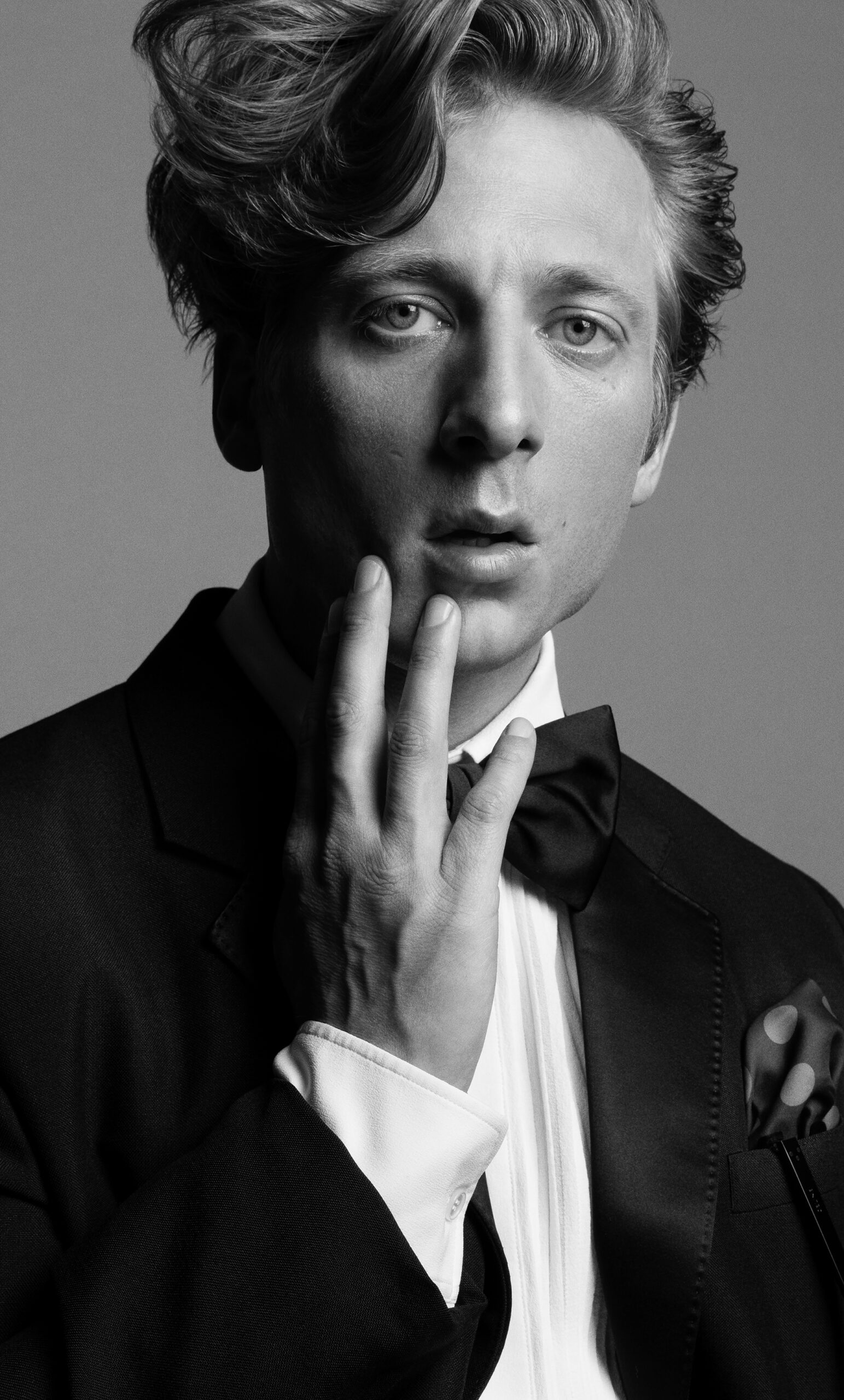
Tuxedo, Shirt, Bow Tie, and Sunglasses (in pocket) Celine. Pocket Square The Vintage Showroom.
WHITE: There was a transference of energy going on where he was like, “This is just a taste of what it feels like to perform onstage for 90,000 people, and for all of them to know every word.” He found me that time and two other times throughout the night to try and give me a taste of what it’s like to be up there and why these guys can’t quit it. And of course they can’t. I’m sure there’s nothing better than being able to perform for people like that.
BUTLER: It’s like going to the moon.
WHITE: Yeah. What do you do after that? Did you feel that at Bad Bunny? Because you were onstage, right?
BUTLER: I was.
WHITE: Bad Bunny in Puerto Rico has to be like Springsteen in Jersey, right?
BUTLER: Exactly. And also to see him come into the person that he is onstage. It’s different when you’re sitting at lunch with somebody.
WHITE: Totally.
BUTLER: Then suddenly, he’s channeling all of their energy into himself and then back to them—that rapport and getting to witness my friend do that, I felt so proud. It was profound.
WHITE: It’s such a beautiful thing. Bruce is so gentle and accommodating when you’re spending time with him, and then onstage, even at the age of 75, he’s coming to cut your head off.
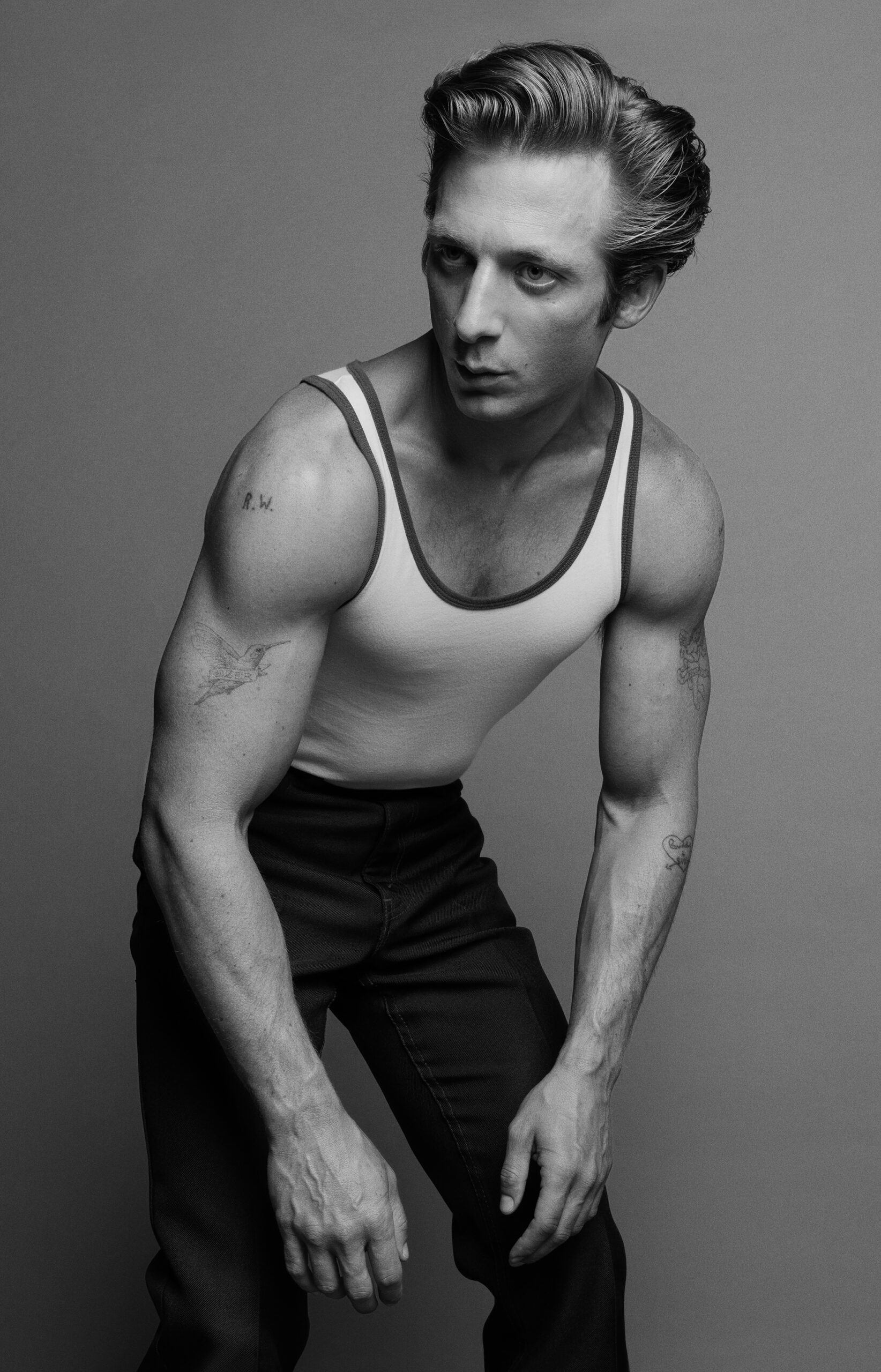
Tank Top and Pants Western Costume.
BUTLER: So special, man. I was just remembering little bits of the film, like when you say the line, “It’s hard coming home.” It’s the exploration of that internal pull between the art and your life and trying to find something real in all the noise.
WHITE: Totally.
BUTLER: Can we talk about that a little bit? I found that so personal to me.
WHITE: When you meet Bruce in this movie, he’s been touring The River, his biggest album up to that point. He’s feeling lost, coming to terms with this newfound fame, and he thinks going home is maybe going to fix it. But you follow yourself everywhere. All it did was bring more to the surface. Bruce spoke to me about this moment where he was with [Matt] Delia driving cross-country, and they’re at the county fair, and he has a panic attack. I was asking him about the source of that panic, and he said he felt like he was a witness to his own life, but that he wasn’t living his life. And I thought, “Oh man, that’s something I relate to so much.” I’m always trying to find a way to be more present, and I think such a source of my fear and anxiety is being in this prison of being a witness to my own life. I think that was the moment where everything changed for him, where he was able to reach out and make room for love. I might be going out on a limb, but it was kind of the stuff that I had going on when I was shooting the movie.
BUTLER: Right.
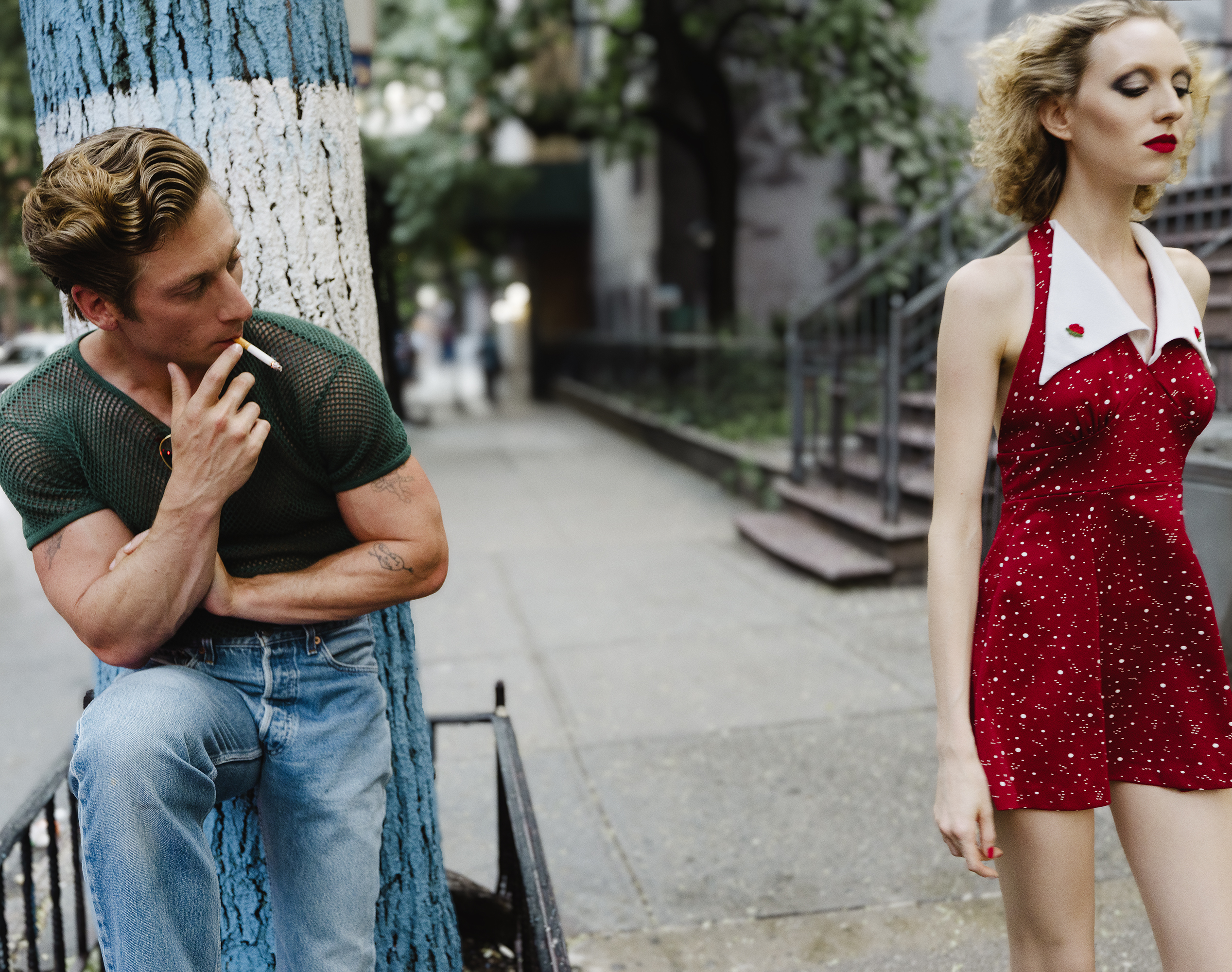
Jeremy wears T-shirt Western Costume. Jeans Levi’s. Sunglasses What Goes Around Comes Around. Delilah wears Dress Western Costume.
WHITE: There was a period in Bruce’s life where he felt, “Maybe I’m not built out for family. Maybe I’m not built out for love—to be a good partner, to be a good father.” And I think the fight that’s going on in this movie, the internal fight, was: He was fighting for the family he would have, but he didn’t know it yet. Now he’s got all these beautiful things, but at the time, I think his greatest fear was, “Okay, maybe I can’t. Maybe I’m not good enough for this.” That was the insecurity, that was the anxiety, that was the anger and deep sadness living inside of him.
BUTLER: Oh, man.
WHITE: I had this moment right before we started filming. I went to his house and he lives very close to where he grew up and it’s a property he was familiar with as a child. He told me he used to bike past it and look down this long driveway and go, “Who lives there?” And it’s his now. He’s raised kids there, and he and Patti live there now, his wife who he’s been with for a very long time. I went over there and I talked to him for a long time and it was getting about time for me to go, and he walked me out and I was looking at the land and I’d met their horses and he and Patti are so in love with each other still. I was getting ready to go and I turned around to him and I was just like, “You did it.” I was so struck. He figured it out. May we all be so lucky.
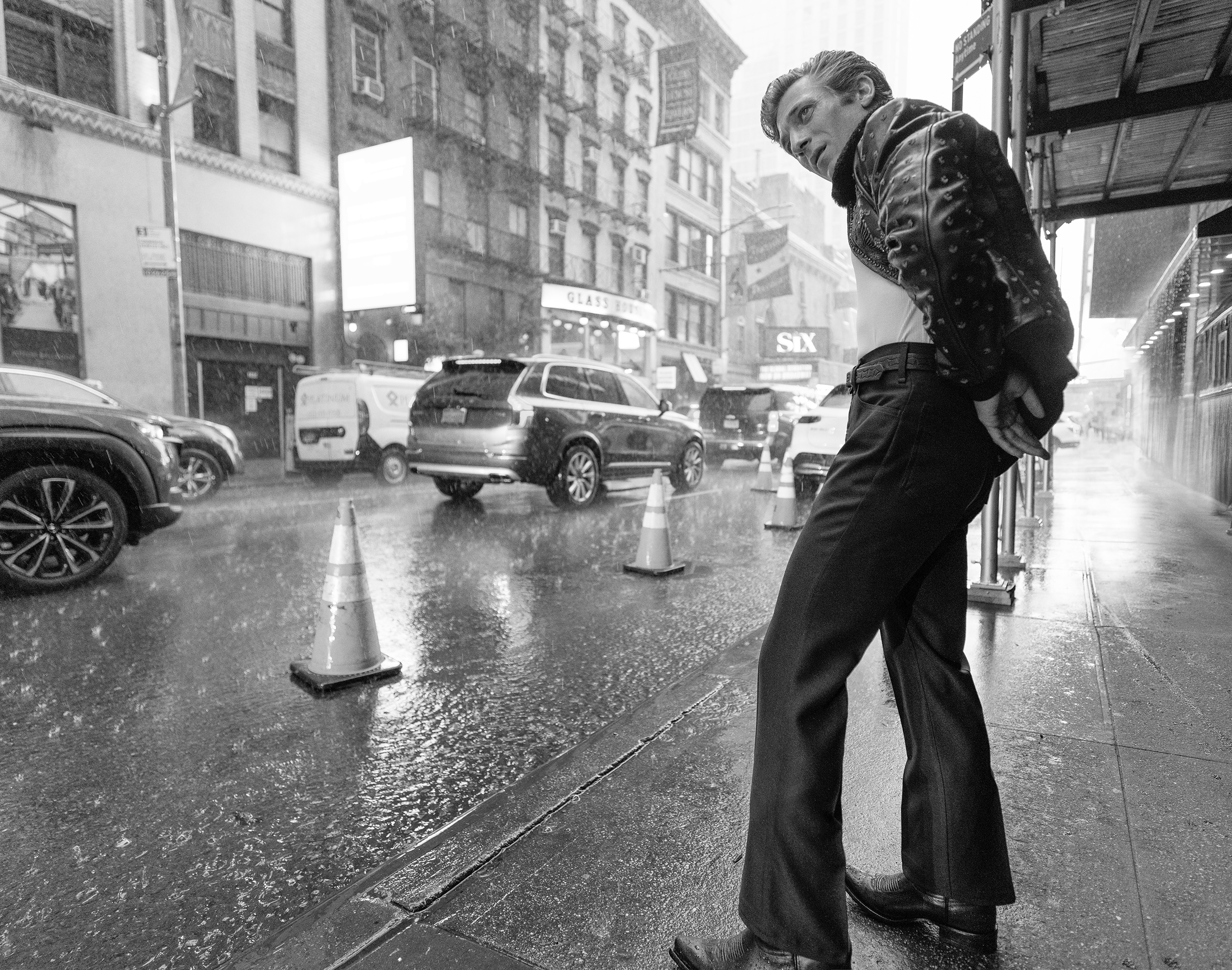
Jacket McQueen. Tank Top Tom Ford. Pants and Belt Western Costume. Shoes Planet Cowboy.
BUTLER: Oh, man. May we all be so lucky. God, what a magical experience. You just made me tear up.
WHITE: It’s wild, man.
BUTLER: And it’s so profoundly universal as well.
WHITE: It’s about those choices you make. Doing the next best thing, the next right thing.
BUTLER: Doing the next right thing. I’ve been thinking about that a lot.
WHITE: Good man.
BUTLER: I love you, brother.
WHITE: Thank you for doing this. I know you’re about to get busy, but I hope I can find you soon.
BUTLER: I’ll come find you.
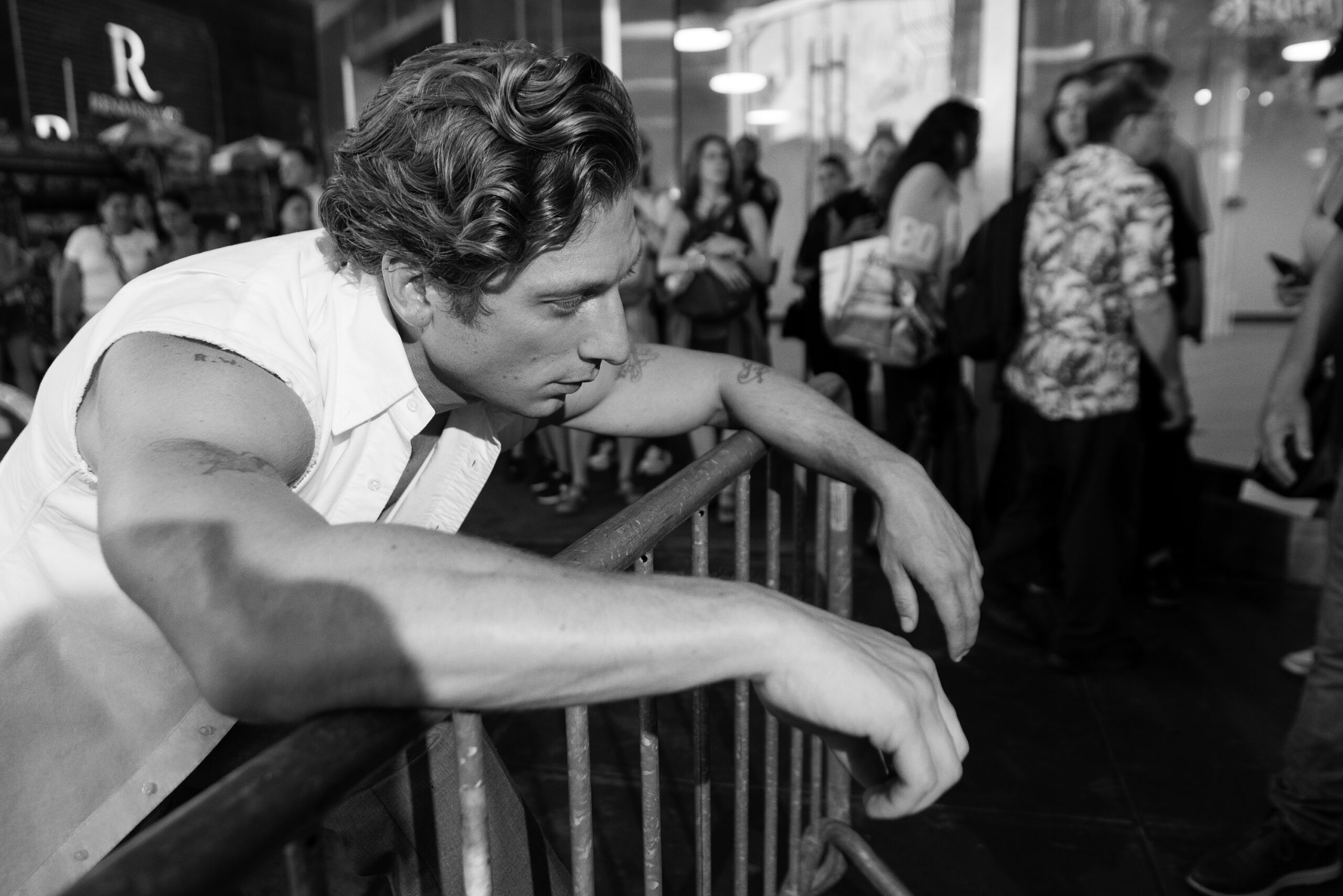
Shirt by Thom Browne.
———
Hair: Jimmy Paul at Susan Price NYC.
Makeup: Fulvia Farolfi using Chanel Beauty at Management+Artists.
Nails: Sonya Meesh using Augustinus Bader at Forward Artists.
Model: Delilah Koch at Muse NYC.
Tailor: Honor Honziali.
Studio Management: Marc Kroop at VLM Productions.
Lighting Direction: Jodokus Driessen at VLM Productions.
Digital Technician: Brian Anderson at VLM Productions.
Photography Assistant: Pat Roxas.
Market Direction: Lucy Gaston.
Fashion Assistants: Archie Grant, Ch’lita Collins, and Jackson Prus.
Production Direction: Alexandra Weiss.
Production: John Nadhazi and Michael Gleeson at VLM Productions and Mara Weinstein.
Production Coordination: Tyler Demauro.
On-set Production: Georgia Ford.
Location: The Times Square Edition.


